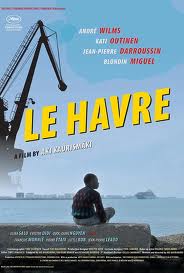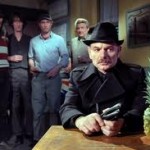 The prolific Aki Kaurismäki is back after a 5 year hiatus to deliver his latest film Le Havre. Normally there are no more than 2 or 3 years between releases for the productive Finn but this lengthier break has not been detrimental to the quality the writer/director produces. Le Havre is a sublimely bewildering mix of bleak and colourful, despondent and hopeful; Kaurismäki blends these themes together effortlessly creating something that straddles the cartoonish and real with ease. The story and visuals are delightful in equal measure and though the film suffers from intermittent immediacy which leaves some scenes impotent, Kaurismäki’s distinctive style renders every scene worth watching.
The prolific Aki Kaurismäki is back after a 5 year hiatus to deliver his latest film Le Havre. Normally there are no more than 2 or 3 years between releases for the productive Finn but this lengthier break has not been detrimental to the quality the writer/director produces. Le Havre is a sublimely bewildering mix of bleak and colourful, despondent and hopeful; Kaurismäki blends these themes together effortlessly creating something that straddles the cartoonish and real with ease. The story and visuals are delightful in equal measure and though the film suffers from intermittent immediacy which leaves some scenes impotent, Kaurismäki’s distinctive style renders every scene worth watching.
The story of Le Havre is classic cinema, so simple yet effectively touching and delightful. An underage illegal immigrant from Gabon named Idrissa (Blondin Miguel) escapes from the police and is sheltered by Marcel Marx (André Wilms). Marcel is a former bohemian author from Paris but today scrapes a living as a shoeshine in the port city of Le Havre. His wife Arletty (Kati Outinen) is hospitalised with illness and he fills the void by attempting to help Idrissa on his journey to London, shielding him from the vigilance of Detective Monet (Jean-Pierre Daroussin).
Kaurismäki’s film draws inspiration from other sources, Detective Monet is based on Porfiry Petrovich from Crime and Punishment while Marcel is a character Kaurismäki has used before in La Vie de Bohème but his own vision is never compromised. Le Havre feels like a different world, totally unique to anything or anywhere. There is a kind of strange socialist vision at work, everybody helps each other, while stuffy capitalists can be seen fobbing off Marcel’s attempts to shine their shoes. Marcel’s stricken wife is a sparingly used addition to the film but adds a distracting layer to the drama; her illness coincides with Marcel’s revelations to a charmingly concise end.
Kaurismäki is at his very best, borrowing from classics but always with his own effusive impression. Some scenes are reminiscent of The Third Man (1949), light streaks from the top left corner illuminating a sign displaying ‘Calais’ as Marcel alights from a bus in the dead of night. The lighting is something Kaurismäki uses to full effect, in an almost Wellesian fashion, veins and bands of light illuminate characters and objects. He creates still frames as characters stand completely still before moving on moments later.
The music is well timed and evocative, lending the feeling of a place stuck in the past. It sounds as though Ennio Morricone has joined The Shadows, used at just the right times to accentuate the action. ‘Little Bobs’ performance during a money raising concert is jarring but satisfying when juxtaposed with this quiet, slow burner.
The Shadows, used at just the right times to accentuate the action. ‘Little Bobs’ performance during a money raising concert is jarring but satisfying when juxtaposed with this quiet, slow burner.
Le Havre is solid in every category without ever being something more than quirky and mildly engaging. Though it is opulently photographed and splendidly acted, it lacks a force that one might expect from the storyline but it stays on the lighter side of the issues of illness and illegal immigration. The fact that it is not nearly as funny as it could be renders it slightly lacklustre, an enjoyable bit of whimsy without leaving too much to consider in retrospect.




